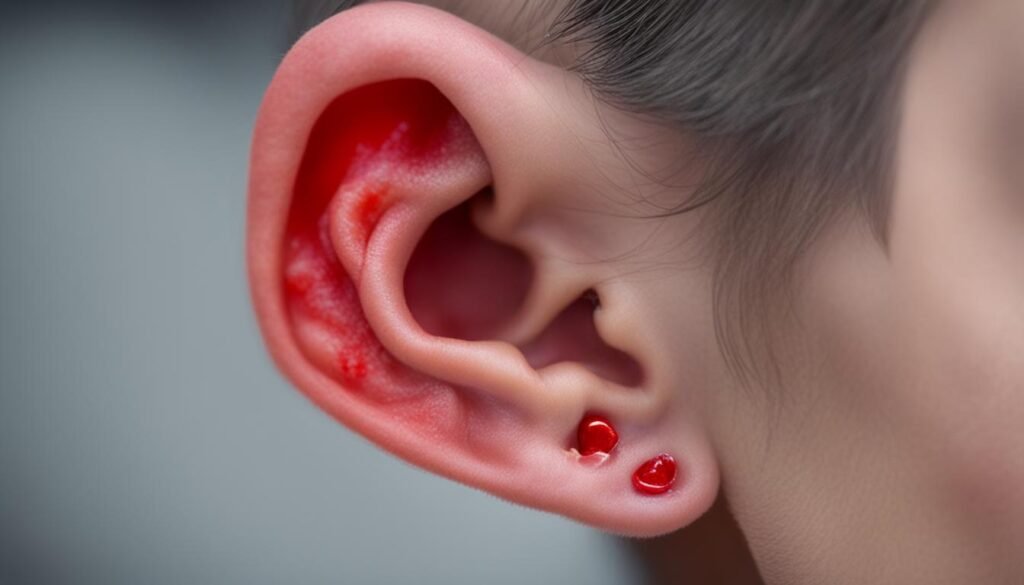Can a cold cause hearing loss in one ear? This question is particularly relevant when dealing with the common frustrations of a cold, such as congestion and a stuffy nose. This article examines the potential link between colds and unilateral hearing loss, focusing on the causes, effects, and available treatment options.
Understanding how a seemingly simple cold can impact hearing in just one ear is important for effective healthcare. While colds are known for their typical symptoms like congestion, the possibility of them affecting hearing, especially in one ear, adds a layer of complexity to their management.
Key Takeaways:
- Colds can cause congestion and fluid buildup in the Eustachian tubes, leading to temporary hearing loss.
- Complications like ear infections can increase the risk of permanent hearing loss, although rare.
- If you experience persistent hearing issues after a cold, it is advisable to seek medical attention.
- Practising good hygiene and promptly treating cold symptoms can help prevent hearing loss.
- Relaxation techniques like yoga and meditation may relieve tinnitus symptoms associated with a cold.
How a Cold Affects Hearing
When a person has a cold, the congestion and mucus in the nose and sinuses can block the Eustachian tubes and interfere with soundwave transmission. This can result in conductive hearing loss, where sounds may seem muffled. Thicker fluid can cause more substantial hearing loss. The hearing loss experienced during a cold is usually temporary and resolves as the symptoms subside. However, it is important to monitor the symptoms and seek medical attention if hearing issues persist after the cold is gone.
In addition to congestion, a cold can lead to inflammation in the middle ear. The inflammation can affect the movement of the eardrum and the tiny bones (ossicles) responsible for transmitting sound. As a result, soundwaves may have difficulty reaching the inner ear, leading to temporary hearing difficulties.
Read Also: can you regain hearing loss after a stroke
If you experience cold-related hearing loss, taking steps to alleviate the symptoms and promote healing is important. Resting and staying hydrated can help your body fight off the cold virus and reduce ear inflammation. Using over-the-counter decongestants can help clear nasal passages and relieve congestion, which may improve hearing. However, following the instructions and consult a healthcare provider if you have any underlying health conditions or concerns is crucial.
Remember, while a cold may cause temporary hearing loss, it is usually reversible and should improve as you recover from the cold. However, if you notice persistent hearing issues or the hearing loss worsens, it is essential to seek medical attention to rule out any other underlying conditions. Your healthcare provider can evaluate your hearing and recommend appropriate treatment options.
Complications of a Cold and Hearing Loss
While a cold may cause temporary hearing loss, complications can lead to more severe symptoms. One possible complication is an ear infection, which can occur due to fluid buildup and congestion in the middle ear. Ear infections are more common in children but can affect people of any age. Symptoms of an ear infection include ear pain, fever, fluid drainage, and temporary hearing loss. It is important to address these symptoms promptly, as untreated ear infections can sometimes lead to permanent hearing loss.

If you or your child experiences ear pain or hearing loss after a cold, it is crucial to consult a healthcare provider. They can properly diagnose and treat underlying complications, such as an ear infection. Treatment for an ear infection may include antibiotics, pain relief medication, and ear drops to reduce inflammation. It is essential to follow the prescribed treatment plan and attend any follow-up appointments to ensure complete resolution of the infection and prevent further hearing loss.
In addition to ear infections, chronic or recurring colds can contribute to chronic inflammation in the middle ear, increasing the risk of long-term hearing issues. This chronic inflammation can lead to otitis media with effusion, with a persistent fluid buildup in the middle ear. If left untreated, otitis media with effusion can cause persistent hearing loss and potentially impact speech and language development, especially in children. Therefore, it is crucial to seek medical attention if cold-related hearing loss persists or recurs frequently.
Seeking Treatment for Cold-Related Hearing Loss
If you experience hearing issues during or after a cold, it is important to monitor the symptoms. Treating the cold at home, getting plenty of rest, and staying hydrated will help improve hearing within a few days. However, if hearing issues persist after other cold symptoms have disappeared, it is advisable to make an appointment with a hearing specialist. They can perform a hearing test and determine if there is any permanent hearing loss. They may also discuss treatment options such as hearing aids.
Getting your hearing checked is crucial, especially if you notice symptoms of hearing loss after a cold. Some common signs include difficulty understanding conversations, asking others to repeat themselves frequently, increasing the volume on electronic devices, and feeling like others are mumbling. If you experience any of these symptoms, it is advisable to seek professional help. A hearing specialist can assess your condition, diagnose the cause of your hearing loss, and recommend appropriate treatment.
Remember, early intervention is key when it comes to hearing loss. The sooner you address the issue, the better your chances of preventing further damage and finding a suitable solution. Don’t hesitate to contact a healthcare professional with any concerns about your hearing.
Preventing Hearing Loss from a Cold
While a cold can temporarily affect your hearing, there are preventive measures you can take to minimize the risk of hearing loss. Practising good hygiene, such as washing your hands frequently, can help prevent the spread of viruses and reduce the chances of getting a cold. Avoiding close contact with sick individuals and wearing a face mask in crowded or high-risk areas can also help prevent the transmission of cold viruses.
It is essential to treat cold symptoms promptly to minimize the impact on your hearing. Taking over-the-counter medications for congestion and following recommended dosages can help clear your nasal passages and prevent fluid buildup in the Eustachian tubes. Additionally, staying hydrated by drinking plenty of fluids can help thin mucus and promote better drainage, reducing the chances of conductive hearing loss.
If you or your child frequently experiences ear infections, it is crucial to consult a healthcare provider for further evaluation and treatment options. They can guide preventive measures and possible interventions to minimize the risk of permanent hearing loss. Additionally, avoiding exposure to secondhand smoke and keeping your ears dry after swimming can further reduce the chances of developing complications that may lead to hearing loss.
When a Cold Leads to Tinnitus
Tinnitus, or ringing in the ears, can be a common symptom experienced during or after a cold. The congestion and fluid buildup in the Eustachian tubes can affect the balance of pressure in the ear, leading to tinnitus. This ringing sensation is often temporary and tends to subside as the cold symptoms improve. However, tinnitus may persist for some individuals even after the cold has resolved.
While there is no cure for a common cold or tinnitus, some remedies can help relieve symptoms and provide some relief. Some people find it helpful to incorporate relaxation techniques such as yoga and meditation into their daily routine. These practices can promote a sense of calmness and help reduce stress, which may alleviate tinnitus symptoms. Additionally, certain breathing exercises during yoga or meditation can enhance blood flow and improve overall well-being.
Read Also: Can wisdom teeth cause hearing loss
It is important to note that the effectiveness of yoga and meditation in relieving tinnitus can vary from person to person. Some individuals may find significant relief, while others may experience minimal or no improvement. Suppose you are considering incorporating these practices into your routine. In that case, it is recommended to consult with a healthcare professional or a qualified instructor who can guide you in selecting appropriate exercises and techniques.
While yoga and meditation may relieve tinnitus symptoms, it is essential to approach them as complementary practices and not as a substitute for medical advice or treatments. If you are experiencing persistent tinnitus or other symptoms, seeking evaluation and guidance from a healthcare professional is always advisable.

Conclusion
In conclusion, while a common cold can cause temporary hearing loss, permanent hearing loss from a cold is rare. The congestion and fluid buildup in the Eustachian tubes can lead to muffled or temporary hearing loss, but this usually resolves as the cold symptoms subside. Ear infections, which can occur as a complication of a cold, may also result in temporary hearing loss. However, with proper treatment, most cases of hearing loss from an ear infection will return to normal.
Monitoring hearing issues during and after a cold is crucial, and if symptoms persist, seeking medical attention is advisable. Although complications such as ear infections can increase the risk of permanent hearing loss, they are usually treatable. It is important to practice good hygiene, promptly treat cold symptoms, and take preventative measures to minimize the risk of hearing loss. Doing so can resolve most cases of cold-related hearing loss independently or with appropriate treatment.
In summary, while a cold can temporarily affect hearing, most cases will not result in permanent hearing loss. Individuals can manage and reduce the impact of cold-related hearing issues by taking proactive measures and seeking medical attention when necessary. Remember to prioritize your hearing health and take steps to protect it, even during a common cold.
Frequently Asked Questions
Can a cold cause hearing loss in one ear?
Yes, having a cold can cause congestion and fluid buildup in the Eustachian tubes, leading to muffled or temporary hearing loss in one ear.
How does a cold affect hearing?
When a person has a cold, the congestion and mucus can block the Eustachian tubes and interfere with soundwave transmission, resulting in conductive hearing loss, where sounds may seem muffled.
What are the complications of a cold and hearing loss?
One complication of a cold is an ear infection, which can occur due to fluid buildup and congestion in the middle ear. Ear infections can cause temporary hearing loss and, in some cases, permanent hearing loss if chronic.
When should I seek treatment for cold-related hearing loss?
If hearing issues persist after the cold is gone, it is advisable to make an appointment with a hearing specialist to determine if there is any permanent hearing loss.
How can I prevent hearing loss from a cold?
To minimize the risk, practice good hygiene, wash your hands frequently, avoid close contact with sick individuals, and treat cold symptoms promptly. Avoid exposure to secondhand smoke and keep your ears dry after swimming.
Does a cold cause tinnitus?
Yes, tinnitus, or ear ringing, can occur or worsen during a cold or flu. This ringing usually subsides as cold symptoms improve.
Can yoga and meditation provide relief for tinnitus symptoms?
Certain relaxation techniques like yoga and meditation may provide relief for tinnitus symptoms.



